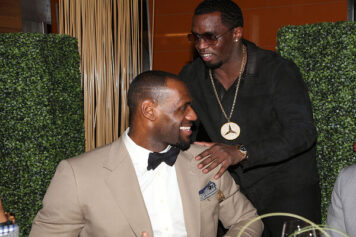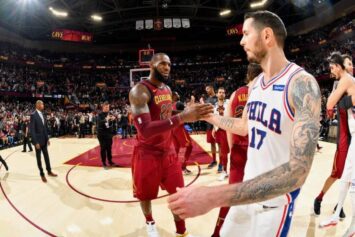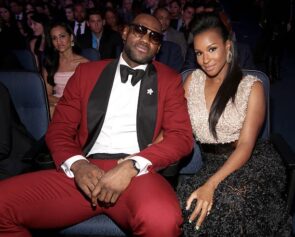While NBA Free Agency has been around since the mid 70’s, yesterday’s process resembles little to nothing compared to today’s three-ring circus that migrates from city to city, network to network and twitter post to twitter post. It was 1970 when Hall of Fame guard Oscar Robertson filed a class action suit against the league along with 13 other players, including Celtics great John Havlicek and future U.S. Senator Bill Bradley. It was similar to the case brought against Major League Baseball by Curt Flood during the same year. However Flood was denied in his attempt, and although a ruling three years later would be in favor of the players in baseball, basketball had to wait until 1976 when the Oscar Robertson v. National Basketball Association was settled, paving the way for the "Oscar Robertson Rule" and free agency.
Since the ruling, players have swapped franchises as if they were summer jobs in anticipation of the next gig. Although in some cases, the choice of where to play basketball next actually altered the landscape of an entire league. Take a look at the players who chose to depart their previous teams and made a seismic impact in doing so. The list is a little less glamorous than one may assume, but nonetheless holds the weight that has shaped the National Basketball Association.
Remember Agent Zero? Yes, as a second-round draft choice of the Golden State Warriors in 2001, Gilbert Arenas became a restricted free agent after only two years in the league. However he would post numbers that no one had anticipated with more than 18 points and six assists during the 2002-03 season. The Washington Wizards were so impressed that they offered an incredible six-year, $60 million offer sheet. According to league rules, teams who were over the salary cap couldn’t match offers from second-round picks, therefore forcing the Warriors to part with Arenas. And while he would go on to average more than 25 points per game over the next three seasons, the action in this process is now referred to as the “Gilbert Arenas Rule,” which in today’s NBA would have allowed the Warriors to re-sign him.
Then there is Carlos Boozer. In 2004 the Cleveland Cavaliers had every intention of locking up LeBron James’ running mate for the foreseeable future; however, someone left the back gate open for a split second and the deal escaped. While Boozer was an overachieving second-rounder like Arenas, averaging a double-double in his second season, he decided to expose then Cavs General Manager, John Paxson, who thought he had a handshake agreement in place. The deal was set to re-sign Boozer to a six-year, $41 million contract, but the Utah Jazz swooped in at the last minute to offer $68 million which was enough for Carlos to kick dirt in the faces of the Cavs. Sure Boozer got his money, but the outcome of this tragic incident shifted the foundation of NBA Free Agency as we know it now. The new collective bargaining agreement is structured in a way that protects teams from allowing this to happen.
Outside the scope of money, free agency also does what it is designed to do which is make teams instantly better. This is definitely the case with unassuming stars who may not have their name in lights, but rather providing teams with the backbone to winning. After three seasons in Golden State, which included two All-NBA Defensive second team selections, Jamal Wilkes signed on to help Kareem Abdul-Jabbar and the Los Angeles Lakers in 1977. In eight seasons, Jamal would play an integral part in winning three NBA championships while also averaging at least 20 points per game in three of those seasons. In that same year of free agency, Gus Williams also left Golden State, a move would change his fortune dramatically. Following an uneventful second year, Williams joined the Seattle SuperSonics and posted a breakout season. He nearly doubled his scoring average to 18.3 points and helped Seattle reach the NBA Finals. He would lead the team in regular season scoring at 19.2 points the following season, and Seattle would claim the NBA championship.
In 2002, a rags to riches story of free agency presented itself. A new option was afforded to teams in the form of what would be entitled “the midlevel exception,” which is the maximum free agent contract option available to teams over the salary cap. It is traditionally the domain of overpaid role players, but the Detroit Pistons would strike gold with Mr. Chauncey Billups. The third overall pick in 1997, Billups bounces around the league and mostly disappointed with his four teams. In Detroit, however, he discovered his true identity as the floor general and designated clutch-shot-maker for what was considered a lockdown defensive team. In 2004 he would guide the Pistons to the promised land by winning a title and claiming Finals MVP in the process. This move not only helped the Pistons, it also helped Chauncy rewrite the "bust" narrative that once defined him.
In looking at the most significant moves in NBA history, the Los Angeles Lakers seem to be in the middle of quite a few of them. But none were bigger than in the summer of 1996 when they found themselves in unfamiliar territory by being a team on the brink of barely making the playoffs. General Manager Jerry West started an overhaul to the franchise by first trading star center Vlade Divac to the Charlotte Hornets for the draft rights to Kobe Bryant, and next making the mammoth move to land none other than Shaquille O’Neal. In what took every dollar they could possibly dig up, O’Neal signed a then record-setting seven year, $120 million contract with L.A., becoming the richest deal in American team sports history. This particular contract led to the NBA setting restrictions on contract length in its next Collective Bargaining Agreement.
Even with the biggest contracts in league history, overpaid players, rule exceptions, and players who helped to win a title, they are pale in comparison to a ”decision” that was made in the summer of 2010. In what changed “everything” that we thought we knew about how free agency worked, LeBron James flipped the sports world upside down when he chose to leave his hometown team, the Cleveland Cavaliers, for the sunny and exotic lifestyle of South Beach to join his buddies Dwyane Wade and Chiris Bosh in Miami. After keeping the world on hold about where he would play, James hosted a one-hour television special on ESPN to announce his decision. Most of the basketball world…wait, even grandmothers and non-sports fans, were outraged. However this deal by far has elevated the hype that surrounds the NBA Free Agency period to this day. The rest is history as LeBron's “decision” actually turned out to be the correct one (at least by most standards). But in the end, and although former commissioner David Stern denies it, the most recent collective bargaining agreement strongly discourages teams from stockpiling squads for the purpose of creating a more competitive balance. But then again, the Spurs took care of such a notion anyway, right?
So what will happen this go-round? Only the basketball gods know, and by that I mean LeBron. His decision, along with that of fellow superstar Carmelo Anthony, once again dictates how everything else will play out across the board. See you on the other side. #RESPECT



